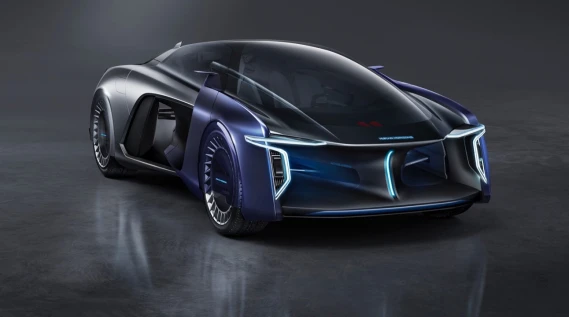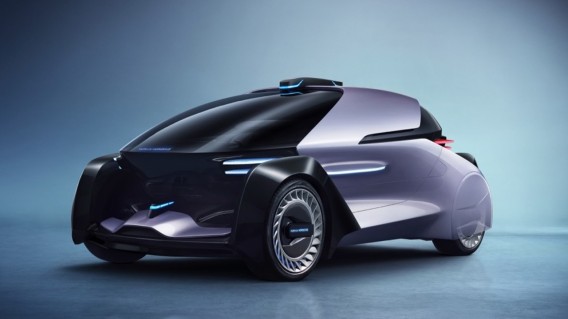Human Horizons aims to be more than just an EV startup in China
Ecosystem is the new buzz word in China’s electric vehicle startup world. Take my recent conversation with James Shyr, chief design officer and a founding partner of Human Horizons, a Shanghai-based company.
“The automotive industry, in our opinion, has largely remained inside its own walled garden, closed off from the rest of the ecosystem,” says Shyr. “We believe this is about to change.”

I have known James for nearly two decades. We met in the early 2000’s when he was design director at the Pan-Asia Technical Automotive Center (PATAC), the SAIC-GM joint venture design and engineering center in Shanghai.
Shyr is not the only GM China alum at Human Horizons. Ding Lei, former SGM general manager, is the founder, chairman and CEO of Human Horizons; and Phil Murtaugh, the former chairman and CEO of GM China, is co-founder and vice chairman. Kevin Chen, another SGM alum, is also a co-founder.
These guys have decades of experience in the traditional automotive world. That gives them a leg up on some other startups, says Shyr. “We know what we are doing, what are the risks,” he says. “We can push the boundaries.” Their long experience has also made them fearless, Shyr adds. “We are not afraid of the unknown. No Fear is our motto for designing the vehicle.”
For sure, the automotive future is a bit murky. So perhaps being fearless is a bonus. In any case, there is no doubt that having so many experienced China auto executives running Human Horizons should come in handy, though the fact that they all come from a traditional automotive background may hinder the company in some ways.
Human Horizons has three parts, Shyr says: The smart car, the smart road, and the smart city. “The vehicle development is the foundation of this company,” he says. “This is what we do best.’
But, he adds, “The smart car itself is not enough.” Hence the smart road and smart city. Human Horizons is developing all three simultaneously, says Shyr.
Human Horizons was “officially sanctioned” on December 12, 2017, but “we were working before that, he says. It was publicly introduced on October 22, 2018 in Shanghai. It has set out a pretty ambitious goal. Here is a quote from Ding Lei: “By re-examining the human-vehicle-road-city relationship and using smart vehicles as the information terminal, HUMAN HORIZONS aims to equip roads with sensors to facilitate smart transportation. Leveraging its digital service operation platform – the Digital House, Human Horizons will create an information system for the smart city.”
Shyr is an automotive designer, so naturally we talk about designing the cars. Human Horizons will only produce electric vehicles, he says. “We truly believe in the all-electric vehicle.” But electric doesn’t mean boring and Shyr set out to prove that with its first concept, the H Hypervelocity car.

The Hypervelocity concept
With the H car, says Shyr, “we were exploring the boundary of how a human can move.” It is a vehicle for a person who would enjoy driving, he says. They designed a computer assisted model, and built a clay model, then decided they hadn’t pushed the boundaries enough, trashed that, and went back to the drawing board.
The current version has some cool features such as a sliding steering wheel – enabled by its steer-by-wire system, or to quote a press release: “The RE.C.E.S.S. or RE-configurable Cockpit Electric Steering System. It would enable anyone “to-be-or-not-to-be-the-captain “at any time, ……because we know that you want to have a choice to work or relax.” The H car also has flexible seating positions, which I guess also helps anyone to be or not to be the captain.
They had a lot of interior space to play with in the design process because the car is powered by in-wheel electric motors produced by Protean Electric! Yep, the Protean Electric led by KY Chan, that I blogged about in late October. Indeed, Shyr told me about the cooperation before Protean put out the official press release. I hadn’t gotten around to writing this up or I would have broken the news.
Human Horizons also has debuted a smaller electric vehicle concept, the A Agility. I can’t even describe it so will just past in the HH description: “The Concept A Active-agility presents a concept based upon a passenger capsule that can be connected to different sub-systems by the top or the bottom to provide different modes of transportation. Its POD (Personification-On-Demand system) provides an intelligent and efficient solution for people to move around and keep connected.”

Active-agility concept
Human Horizons will launch its first product in 2021, says Shyr, and is forming a sales channel right now. The first vehicle to market won’t be one of the futuristic concept vehicles. No, it will be a mainstream electric vehicle offering a portfolio of electric powertrains including in-wheel motors, he says. They will create a vehicle brand name in mid-2019, says Shyr.
The vehicles will be produced at several plants that are “in the works,” says Shyr. It seems both are in Yancheng, a city in northeastern Jiangsu province. The plants are “80 percent greenfield,” he says.
Connections matter
Human Horizons will build more than just plants in Yancheng. The city will also be the testing ground for the smart car-smart road-smart city ecosystem Human Horizons is developing, says Shyr. The Yancheng government is an investor in Human Horizons, which should smooth the approval process quite a bit. “That is why we are so confident we are going forward,” says Shyr.
He figures a working model of the smart ecosystem concept will be in place “no later than 2025.” There isn’t anything revolutionary about the technology, says Shyr. What is revolutionary is the way Human Horizons will put it all together, he says. “A lot of new startups concentrate on the vehicle alone,” says Shyr. “Does this world need another car company? No.”